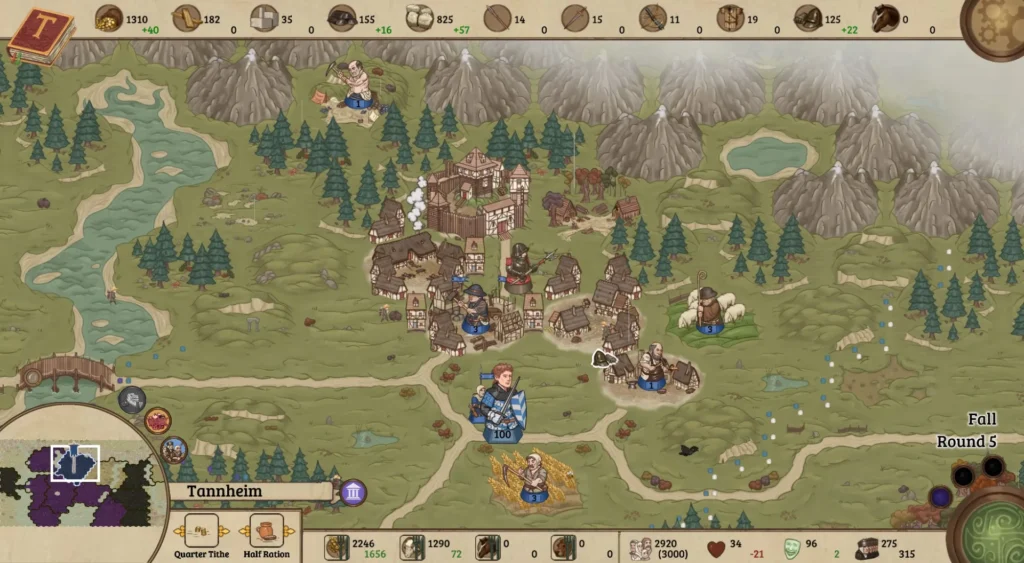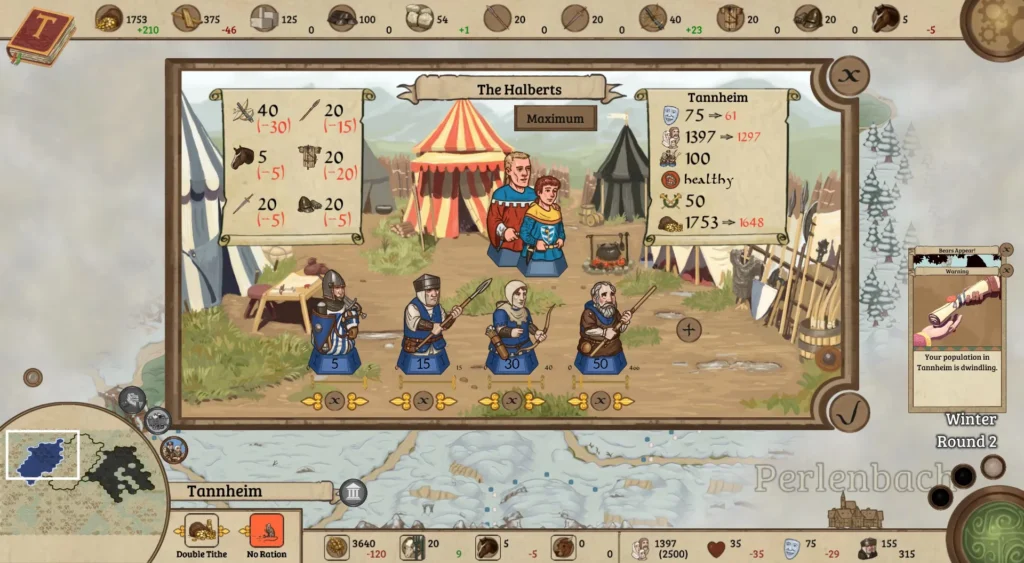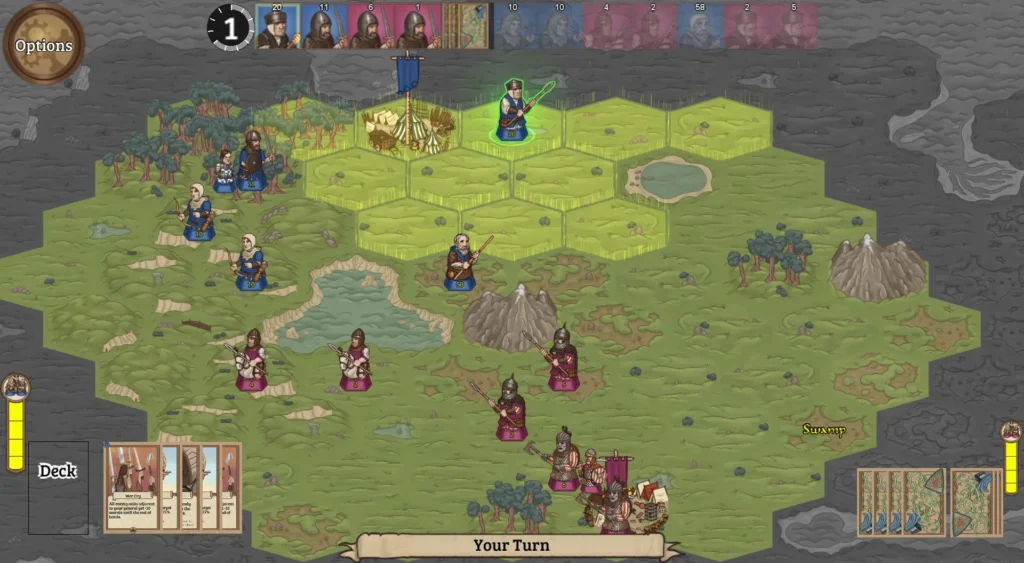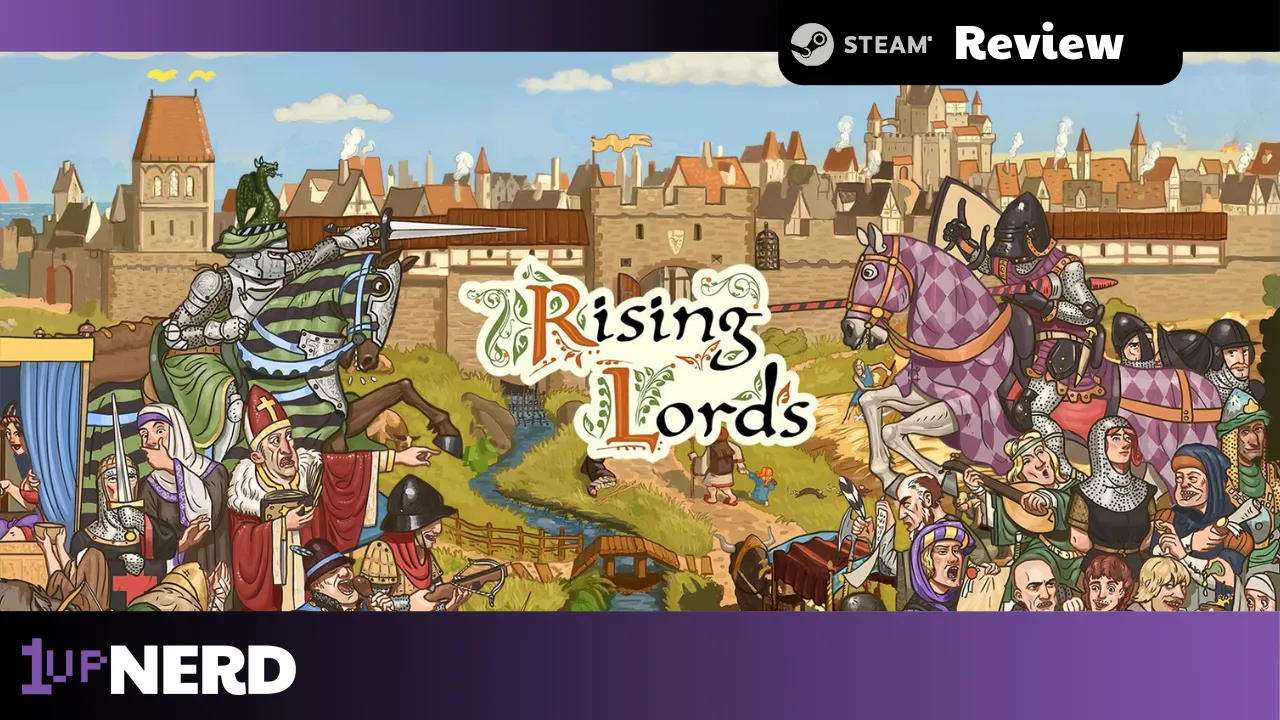Rising Lords is a turn-based strategy game with a medieval setting. Developed by independent studio Argonwood and published by Deck13 Spotlight, the game has been available on Steam, Xbox and Nintendo Switch since 18 January 2024.
Rising Lords is based on a very interesting premise, as it presents us with elements that are reminiscent of board games and deck-building mechanics. Our goal in this strategy game is to manage and expand our kingdom.
The game consists of two main and interrelated elements: management of our kingdom and battles.
On the one hand, we have the management of our kingdom. We need to collect resources such as grain to feed our citizens, wood and iron to build more buildings and to arm our troops. It is necessary to have enough citizens to employ in the various structures for the production and gathering of resources. As our town expands and the population increases, we can also start constructing new buildings such as the forge, which will allow us to start building our army.
The management of our kingdom is the first aspect that we need to keep under control. However, there is also an option to automate the management. When this option is enabled, citizens are automatically assigned to the various structures.

As well as managing resources, we also need to keep the morale of our citizens high. Morale is affected by the amount of food available to our citizens and the amount of taxes collected. We have to find the right balance to make the kingdom thrive.
Throughout the game, there will be random events that can increase or decrease taxes, or vary the amount of food available. We can also buy and sell goods from merchants and hire mercenaries.
There are some aspects that did not convince us regarding the management and expansion of the kingdom. It’s not clear how the population is going to grow. We are told that the happiness of the citizens causes immigration and vice versa, but it is not possible to know in how many turns the population will increase. This is a major limitation in a management game. In addition, the type of buildings you can build is also limited.
The battle begins
Let us now move on to another key component of Rising Lords: the battles. Battles take place on a turn-based system, which is also used for the initial deployment of troops. During deployment, we and our opponent take turns deploying troops.
When forming an army, we can divide our troops into groups, for example, two groups of archers. However, when we deploy them into battle, we end up with all our archers in one group. This severely limited our chances of developing an effective battle strategy and encircling our enemies.

However, once the troops have been deployed and a commander assigned to one of them, the battle can begin. There are several things to consider when starting to fight.
Our army is made up of different units, such as archers and pikemen. Each unit has its own weaknesses and bonuses against certain units – for example, pikemen have an advantage against mounted units.
Terrain also plays an important role. Hills, for example, will increase the range of your archers. A third important factor to consider during battle is morale. If morale drops, our troops will become weaker, and if morale reaches zero, our army will flee. The best way to raise morale is to capture the enemy camp and kill the enemy general.
Battles also bring bonuses in the form of cards. We can spend our general’s XP to buy cards and build our deck before the battle. At the start of the battle, cards are randomly drawn. These cards can increase your army’s defence or attack, or help you overcome obstacles on the map.
All these variables have to be taken into account in battle. Unfortunately, if you’re outnumbered, there’s little hope of defeating your opponents.

Rising Lords offers us several modes. The main campaign, made up of six episodes, is accessible once you have completed the tutorial, which also serves as the game’s prologue. The tutorial explains the basics of managing a kingdom and fighting a battle. However, there is no in-game wiki to provide detailed information on troops and buildings.
The main campaign offers us a series of objectives. Almost all of these objectives have a turn limit. It is therefore a truly guided campaign that limits our choices and makes it easier to fail.
Scenarios allow us to change the map, the availability of resources and even the characteristics of our opponents. The multiplayer mode allows you to play against other people both locally and online. There is also a challenge mode, where at the end of each round we have to face a battle and can win rewards.
Rising Lords has a very distinctive graphical style, with a hexagonal grid and pawns that represent our citizens and soldiers. The soundtrack also helps to immerse us in the medieval style.
Unfortunately, although the game is generally pleasant, the overall experience is not without friction. The manual save system is not intuitive, as it forces you to load the game from one of the three automatic saves, while to load a manual game you have to go to the single player sub-menu. The main campaign is underwhelming and, in general, neither the city management nor the battles, which seem too dependent on the size of the army, really convinced us.





Leave a Reply